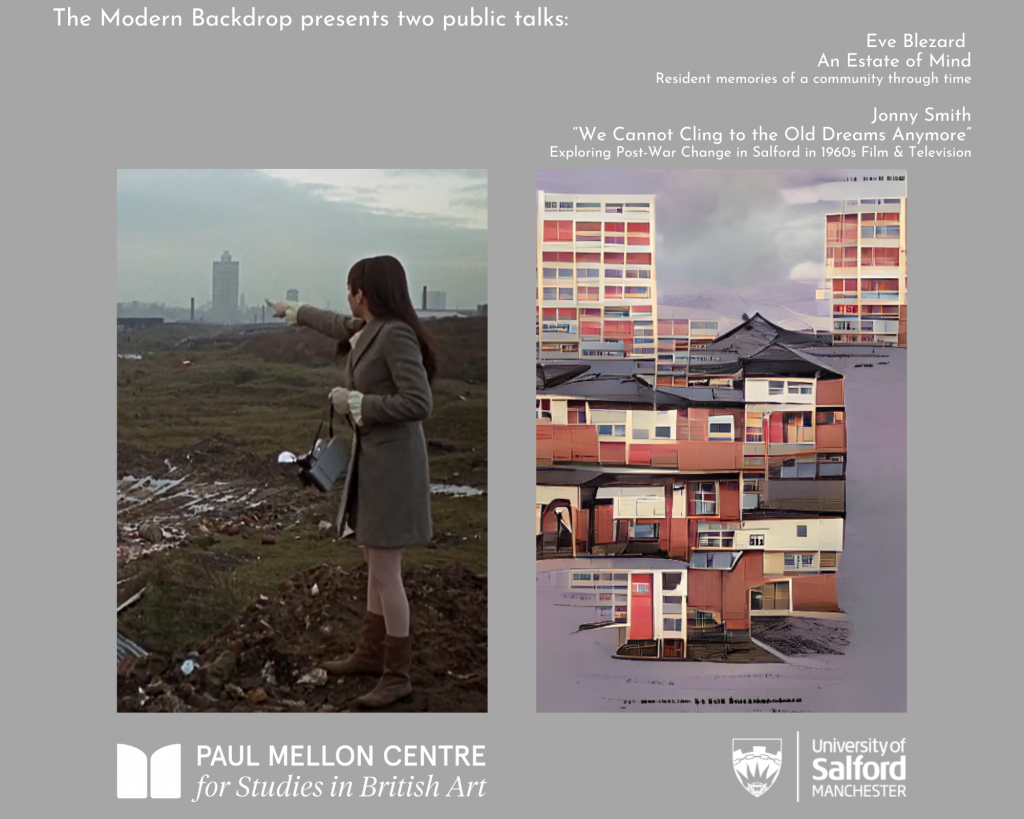
Eve Blezard. An Estate of Mind: Resident memories of a community through time
Jonny Smith. “We Cannot Cling to the Old Dreams Anymore”: Exploring Post-War Change in Salford in 1960s Film & Television
Join us on
Friday, 4th November 2022, 3pm – 5pm
At the University of Salford, Peel Park Campus, Lady Hale Building, Room: G06/G07
An Estate of Mind: Resident memories of a community through time
Drawn from residents’ interviews, found poetry and archival material, this talk relays narratives of change, loss and community to present a story of one northern social housing estate across 35 years. This story highlights the significance of reminiscence, community and the resident voice against a backdrop of hope, austerity and harsh realities.
Bio: Dr Eve Blezard is an early career researcher passionate about improving local communities’ sustainability through combined research and practice. Eve is a Research Fellow at the University of Salford working on participatory action research on developing age-friendly communities, focusing on the city of Salford as a case study. She has a background in social housing. She worked as a Customer Insight Analyst for Progress Housing Group, a not-for-profit housing provider in the North-West of England and in community development. Here she won the 2015 TPAS Resident Involvement Officer of the year for the Northern Region for her work in Salford with City West Housing Trust. The talk relates to her PhD thesis: ‘Change, Loss, and Community: Residents’ narratives of life on a social housing estate.
“We Cannot Cling to the Old Dreams Anymore”
Exploring Post-War Change in Salford in 1960s Film & Television
This talk explores post-war change in Salford, particularly in relation to urban redevelopment and slum clearances, through representations of the city in 1960s film and television. It briefly examines the representations of pre-war Salford in Hobson’s Choice (1954) and Love on the Dole (1941) before comparatively looking towards the post-war period through Coronation Street (1960-), A Taste of Honey (1961), Charlie Bubbles (1967) and The White Bus (1967).
The talk investigates the popular image within wider public imaginations of the physical and social changes that Salford underwent in the immediate post-war period.
The value of examining cultural representations in tracing wider post-war histories of Salford is also investigated, as are the various ways to approach such research which draws on textual analysis, archival reception studies and broader production contexts. Alongside wider cultural engagements with the city, such as the photography of Shirley Baker and the music of The Smiths, I argue that Salford’s on-screen representations have made it an enduring and crucial visual touchstone in wider post-war histories of Britain.
Bio: Dr Jonny Smith is currently a researcher and teaching assistant at the University of Manchester, where in April 2022 he completed his AHRC funded PhD in Film Studies. His thesis, titled ‘Nasty, Brutish & Tall: The Utilisation & Representation of Brutalist Architecture in British Cinema Post 1970’, builds on a broader interest in British Cinema, representations of place and architecture, as well as their intersection with issues of class, power and regional identity.